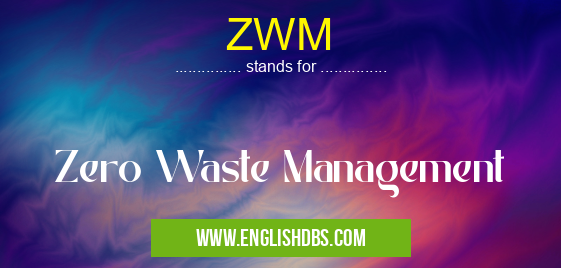What does ZWM mean in ENVIRONMENTAL
Zero Waste Management (ZWM) is an approach to resource and waste management that focuses on reducing the amount of waste generated and ensuring that as much of this waste as possible is reused or recycled. ZWM principles strive for a closed loop system in which all resources are cycled back into production after their useful life has ended, and nothing is discarded as un-recyclable.

ZWM meaning in Environmental in Governmental
ZWM mostly used in an acronym Environmental in Category Governmental that means Zero Waste Management
Shorthand: ZWM,
Full Form: Zero Waste Management
For more information of "Zero Waste Management", see the section below.
Essential Questions and Answers on Zero Waste Management in "GOVERNMENTAL»ENVIRONMENTAL"
What is Zero Waste Management?
Zero Waste Management (ZWM) is an approach to resource and waste management that focuses on reducing the amount of waste generated and ensuring that as much of this waste as possible is reused or recycled.
How does Zero Waste Management work?
ZWM involves focusing on resource reduction, reuse, repair, upcycling, composting, recycling and sharing instead of traditional forms of disposal. It involves using natural processes such as composting to break down organic materials back into the soil and investing in newer technologies such as advanced sorting systems to process recyclables.
What are the benefits of Zero Waste Management?
Zero Waste Management can help reduce landfills, conserve resources, reduce energy consumption, improve air quality, reduce water pollution levels, eliminate toxins from entering our food chain and create more employment opportunities in green job sectors.
What does a zero-waste lifestyle look like?
A zero-waste lifestyle focuses on reducing individual consumption by reusing items in their current form or finding new ways to use them. It also encourages people to invest in long-term products over disposable ones whenever possible, avoiding single-use plastics when feasible. Furthermore it seeks to avoid buying things made from toxic or hazardous materials where possible and encourages people to adopt a minimalist approach with their closets and other possessions.
What are some actions I can take now towards zero waste management?
People can begin taking action right away by refusing single use plastics such as straws or packaging wherever possible; bringing reusable bags shopping; refusing "fast fashion" clothing; composting organic food scraps; returning glass bottles for deposit money; supporting local businesses who focus on sustainable practices; sending electronics and batteries for proper recycling; replacing household cleaners with natural alternatives; considering bicycles or public transport rather than cars when travelling shorter distances etc.
Final Words:
The implementation of Zero Waste Management principles can help us move closer towards a more sustainable future by improving efficiency across all material cycles within society while reducing environmental impacts caused by our collective consumption patterns. This means fewer resources are needed for production and fewer wastes being disposed off around the world.
